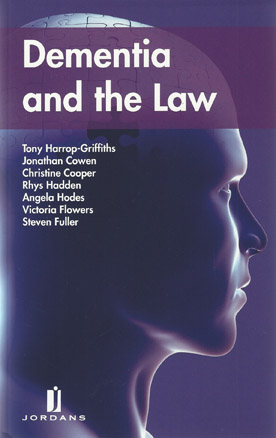
This book addresses the full range of legal issues that arise in respect of people suffering from dementia, setting out the law in a clear and accessible form.
Starting from the initial stages of obtaining information, the book follows a logical sequence through: the powers under the Mental Health Act 1983 (MHA); rights to assessment, treatment and care services; the Mental Capacity Act 2005; financial deputies and attorneys; and care funding, before concluding with a detailed section on the remedies which may be deployed to resolve disputes in these areas.
The first section of the book deals with legal issues that arise at the time of diagnosis and in the period when the dementia begins to have a significant impact on the person’s life. Access to information about a person with dementia is a particularly complex problem and one that the Alzheimer’s Society is regularly asked about. The rights and duties of disclosure of personal data and medical information are set out in this context. The powers to detain a person with dementia under the MHA are explained as is the role given to the nearest relative. This section concludes with a chapter on the three different types of assessment that will commonly be applicable to a person with dementia. These are (i) capacity assessments under the Mental Capacity Cat 2005 (MCA); (ii) continuing healthcare assessments; and (iii) assessment for local authority services.
The second section of the book is focussed on legal issues surrounding the care provided to a person with dementia. The concept of ‘best interests’ is explained at the start of this section along with the legal approach under the MCA to making decisions for the person with dementia (such as when to deprive that person of his or her liberty, for example). The rights to receive a particular medical treatment and to refuse treatment are set out before turning to the legal issues surrounding care services provided by the local authority, this includes both care services in the home and those provided in residential care homes.
The third section of the book is concerned with the property and financial issues affecting those with dementia. The legal processes, powers and obligations of attorneys and financial deputies are set out and explained in context along with practical information about the most common problems (such as the sale of property, for example). This section concludes with a chapter covering issues concerning the funding of care. These include aftercare under the MHA, continuing health care, individual budgets and direct payments and self-funding.
The final section of the book concentrates on the remedies available when disputes arise as they are likely to apply to a person suffering from dementia. The first chapter in this section deals with the informal processes available, up to and including a complaint to the relevant Ombudsman. Alternative methods of dispute resolution can be particular important where there is a need for on-going care services and these are explained before turning to the substantive remedies available through proceedings in the Court of Protection and applications for judicial review.
This book covers both England and Wales to include additional reference wherever the law differs in Wales.